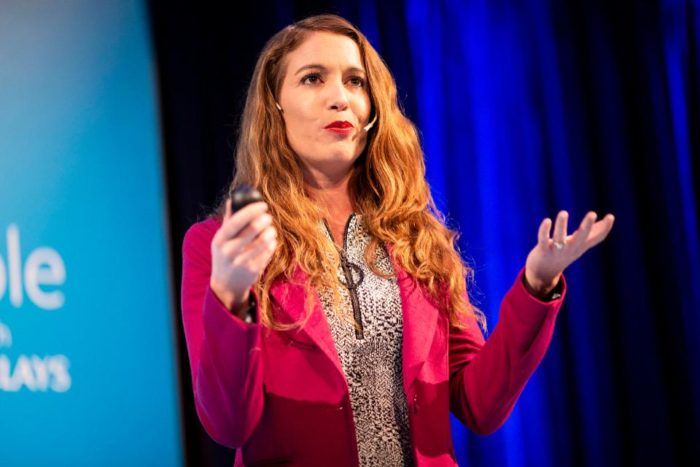Having spent a lot of time in rooms surrounded by successful male entrepreneurs, I found the lack of self-promotion by women entrepreneurs to be staggering.
A new study shows that 69% of women entrepreneurs would rather minimize their successes than tell people about them.
by Lisa Curtis Small Business / Founder of Kuli Kuli, a mission-driven moringa food startup / For Forbes
photo: Lisa Curtis Pitching Onstage at the Barclays Unreasonable World Forum / CHET STRANGE
Recently, I sat in a room with dozens of the most successful women entrepreneurs in the country. Had I not known that every woman in that room had been hand-selected for her business prowess, I might have thought it was simply a group of female friends having a reunion.
While a certain amount of informal chatting is to be expected, the remarkable thing about that room of high-powered female entrepreneurs was that at no point did I hear anyone come close to bragging about the amazing success of their $20M+ companies or their $100M exits. Having spent a lot of time in rooms surrounded by successful male entrepreneurs, I found the lack of self-promotion to be staggering.
Coming closely on the heels of Women’s Entrepreneurship Day, a new study showed that 69% of women would rather minimize their successes than tell people about them. This “self-promotion gap” appears to grow with age, with older women being 20% more likely to want to blend in and downplay their strengths. This means that the women who are most advanced in their careers, and likely have the most accomplishments, are the least likely to talk about them.
While humility is a trait with many virtues, it is not a helpful one in the field of entrepreneurship. By definition, entrepreneurs are creating something out of nothing. Most investors, particularly at early-stages, are investing more in the founders than the idea or product. The more impressive the founder makes herself out to be, the more likely she’ll be successful in raising the money she needs to scale. Clearly this isn’t happening as it should. I’ve written about this challenge before, noting that women are starting companies at a rate of 1.5x times higher than the national average but male-owned businesses receive 23x more VC funding.






